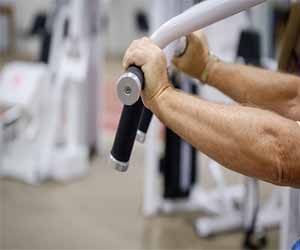- Home
- Editorial
- News
- Practice Guidelines
- Anesthesiology Guidelines
- Cancer Guidelines
- Cardiac Sciences Guidelines
- Critical Care Guidelines
- Dentistry Guidelines
- Dermatology Guidelines
- Diabetes and Endo Guidelines
- Diagnostics Guidelines
- ENT Guidelines
- Featured Practice Guidelines
- Gastroenterology Guidelines
- Geriatrics Guidelines
- Medicine Guidelines
- Nephrology Guidelines
- Neurosciences Guidelines
- Obs and Gynae Guidelines
- Ophthalmology Guidelines
- Orthopaedics Guidelines
- Paediatrics Guidelines
- Psychiatry Guidelines
- Pulmonology Guidelines
- Radiology Guidelines
- Surgery Guidelines
- Urology Guidelines
Resistance exercises protect bone loss in obese elderly on weight loss regime

Resistance and combined aerobic and resistance exercise versus aerobic exercise protects against bone loss during weight loss therapy of older adults with obesity.
USA: Obese adults in their weight loss efforts tend to become more prone to fractures due to a decrease in bone mineral density (BMD) associated with dieting and other weight loss therapies. Now, a recent study published in the Journal of Bone and Mineral Research seems to have found a solution to this. According to the study, resistance and combined aerobic and resistance exercise versus aerobic exercise is associated with less weight loss-induced decrease in bone turnover.
Aerobic exercises included walking on a treadmill, riding a stationary bicycle, and stair climbing. Resistance exercises included upper- and lower- body exercises using weight machines.
In a bid to find the most appropriate exercise types to combine with weight loss therapy in this older population, Dennis T Villareal, Baylor College of Medicine, Houston, TX, USA, and colleagues performed a head‐to‐head comparison of aerobic or resistance exercise, or both, during matched ~10% weight loss in 160 older adults with obesity in a randomized controlled trial.
For the study, the researchers randomly assigned 141 obese adults to one of four groups: 1) dieters who did only aerobic exercise; 2) dieters who only did resistance exercise; 3) dieters who did both types of exercise; and 4) control group that didn't exercise or diet. Dieters met with dieticians and did supervised workouts over 26 weeks, while the control group attended some education sessions on healthy eating.
Read Also: Good exercise capacity lowers all cause mortality in women: ESC study
Key findings of the study include:
- People in all three diet groups lost about 9% of their body weight during the study, compared with 1% in the control group.
- After 6 months of intensive lifestyle interventions, BMD decreased less in the resistance group (−0.006 g/cm2 [−0.7%]) and combination group (−0.012 g/cm2 [−1.1%]) than in the aerobic group (−0.027 g/cm2 [−2.6%]).
- Serum C‐telopeptide, procollagen type 1 N‐propeptide, and osteocalcin concentrations increased more in the aerobic group (33%, 16%, and 16%, respectively) than in the resistance group (7%, 2%, and 0%, respectively) and combination group (11%, 2%, and 5%, respectively).
- Multiple regression analyses revealed that the decline in whole body mass and serum leptin were the independent predictors of the decline in hip BMD.
Read Also: Lighter-intensity exercise lowers fracture risk in older women: JAMA
Based on the findings, the authors recommend both resistance and combined aerobic and resistance exercise to protect against bone loss during weight loss therapy of older adults with obesity.
The study, "Effect of Aerobic or Resistance Exercise, or Both, on Bone Mineral Density and Bone Metabolism in Obese Older Adults While Dieting: A Randomized Controlled Trial," is published in the Journal of Bone and Mineral Research.

Disclaimer: This site is primarily intended for healthcare professionals. Any content/information on this website does not replace the advice of medical and/or health professionals and should not be construed as medical/diagnostic advice/endorsement or prescription. Use of this site is subject to our terms of use, privacy policy, advertisement policy. © 2020 Minerva Medical Treatment Pvt Ltd